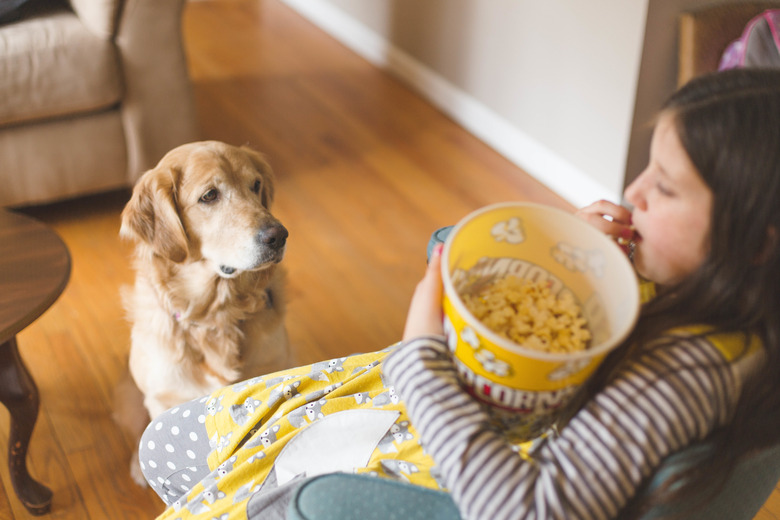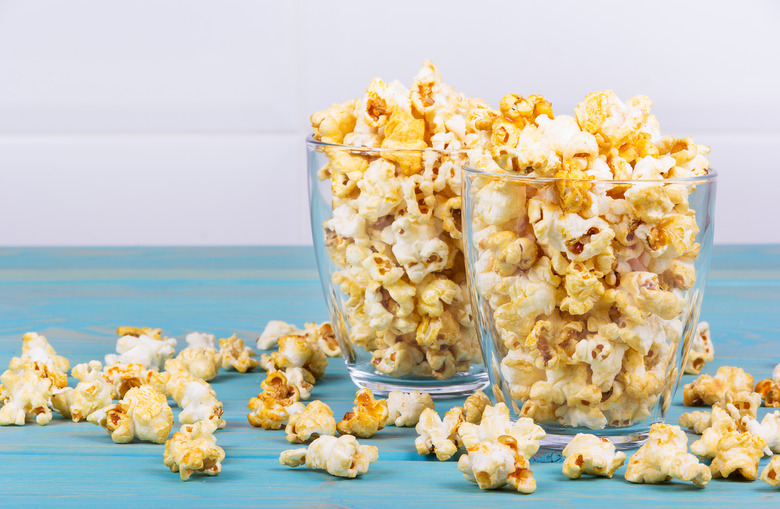Can Dogs Eat Popcorn?
Popcorn is a delicious treat for humans that's best enjoyed during movie night on the comfort of the couch. But can your dog partake in enjoying popcorn? Even though corn can be found in some dog food as a source of carbohydrates, B vitamins, magnesium, and phosphorus in general, pet parents should not give their dog popcorn. For some pets, popcorn can cause digestive issues and put them at risk for long-term health issues, such as obesity. Talk with your veterinarian about healthy snack options for your pooch.
Where does popcorn come from?
Where does popcorn come from?
While we don't definitively know the first-ever instance of humans eating popcorn, there is evidence of popcorn dating back thousands of years. In 1948, Herbert Dick and Earle Smith discovered small heads of Zea mays everta (the kind of corn kernels that are used for popcorn) in a cave in New Mexico.
The artifacts were carbon dated and estimated to be 5,600 years old. There is also evidence of ancient popcorn consumption in Central and South America. In 1885, the first large-scale commercial popcorn machine was invented by Charles Cretors. Now, popcorn is a ubiquitous snack at public events as well as at home.
Can dogs eat popcorn?
Can dogs eat popcorn?
In general, it is not safe to feed popcorn to your dog, even though corn itself is not toxic to dogs. Popcorn may be a quick and satisfying treat for you, but it may cause serious harm to your dog. Even without the seasonings or butter that can make your dog sick, popcorn might get stuck in your canine's throat and block their airway. Each dog is different, so talk to your veterinarian about what is safe for your dog's health given their size, age, breed, medical history, and activity level.
How to safely feed popcorn to your dog
How to safely feed popcorn to your dog
If your veterinarian says it's OK, you can occasionally feed your dog a small amount of popcorn following these guidelines:
- Use air-popped popcorn, which is best done in the microwave or in an air popper.
- No butter or oil.
- No salt, sugar, or other seasonings, flavorings, additives, or preservatives. Some caramel popcorn or candy corn may have sweeteners like xylitol, which is toxic to dogs.
- No toppings.
- Remove any unpopped kernels or partially popped kernels.
- Depending on your dog's size, you can offer them up to a few pieces of popcorn.
- Don't feed popcorn to dogs who are missing multiple molars or who are toothless.
- Don't feed popcorn to dogs with a corn allergy.
- Don't feed popcorn to dogs who are overweight.
How much popcorn can a dog eat?
How much popcorn can a dog eat?
How much popcorn a dog can eat depends on the dog's size. If your dog is a teacup Chihuahua, one piece on special occasions is fine. But since their mouth is so small, break up the popped kernel into multiple smaller pieces first.
If your dog is a Great Dane or a Saint Bernard, up to 10 pieces of plain, air-popped popcorn is OK. Again, reserve this as a treat for a special occasion. Don't give your dog popcorn more than once a month.
If your dog is missing multiple teeth, especially their back teeth (molars), do not give them any popcorn because they won't be able to chew it properly. This poses a choking hazard. Bits of popcorn kernels can also get stuck in your dog's teeth.
What are the risks of feeding popcorn to your dog?
What are the risks of feeding popcorn to your dog?
Popcorn is a choking hazard. If you want to make sure your dog is safe, settle in for the evening with a few dog treats on hand to give them while you keep the popcorn for yourself. Unbuttered, unsalted popcorn is not known to be harmful; however, popcorn poses a choking hazard. If you do feed your dog popcorn, only use fully popped, unseasoned kernels. Call your veterinarian immediately if you think your dog might be choking.
A lot of small-breed dogs tend to lose teeth as they age, or they end up needing a lot of dental extractions. If your dog is missing some molars (the chewing teeth) or if they are completely toothless, don't feed them popcorn.
Salt and dairy are dangerous for dogs. Butter, salt, and other common popcorn seasonings can cause serious health problems for your dog, like vomiting, diarrhea, or pancreatitis. Large amounts of salt can cause sodium ion poisoning, and onions, chives, and garlic are all toxic to dogs in large quantities. Milk-based products can cause digestive upset.
Obesity is another risk. Corn is used to fatten cattle, and similarly, it can do that to dogs as well. Too much popcorn can cause your dog to gain weight. Weight gain will predispose your pup to long-term health problems, like osteoarthritis and diabetes.
Is microwave popcorn toxic to dogs?
Is microwave popcorn toxic to dogs?
Plain, unseasoned microwave popcorn is not toxic to dogs. Air popping in the microwave or in an air popper is actually ideal because the kernels pop more quickly and are less likely to burn compared to air popping on the stove, which takes longer.
Can popcorn upset a dog's stomach?
Can popcorn upset a dog's stomach?
Yes, popcorn can upset a dog's stomach. Some dogs are allergic to corn, so popcorn can cause an upset stomach and digestive tract or skin inflammation. Popcorn that contains butter, oil, salt, or other seasonings can irritate your pup's belly as well.
Breeds that are prone to pancreatitis, such as miniature schnauzers, Yorkshire terriers, cocker spaniels, poodles, and dachshunds, are more likely to get sick after eating popcorn made with butter; oil; or fatty toppings, like cheese.
The bottom line
The bottom line
Is popcorn bad for dogs? It is for some. Even though it's tempting to give your pup people food, you should ideally keep your bowl of popcorn to yourself. Corn itself is not toxic to dogs and is found in some pet foods, but popcorn is a choking hazard. Dogs should not eat seasoned or buttered popcorn because salt, butter, and common popcorn seasonings can be harmful to them. Even plain popcorn increases your dog's daily caloric intake, which can result in weight gain and long-term health issues, like diabetes. It's better to save the popcorn for yourself and offer your pooch some low-calorie dog treats instead. For more information, check out this list of human foods that your dog can eat.



